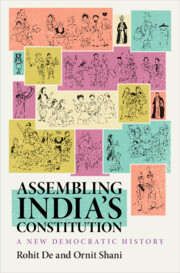Book contents
- Reviews
- Assembling India’s Constitution
- Assembling India’s Constitution
- Copyright page
- Dedication
- Contents
- Figures
- Acknowledgements
- Note on Terms
- Introduction
- 1 ‘Our Constitution’
- 2 Making the Constitution a Public Affair
- 3 Competing Constitutionalism
- 4 The Emerging State and the Constitution
- 5 The Theatre of the Assembly
- 6 The Horizons of India’s Constitutional Imagination
- Conclusion
- Bibliography
- Published Primary Sources
- Secondary Literature
- Index
2 - Making the Constitution a Public Affair
Published online by Cambridge University Press: 24 September 2025
- Reviews
- Assembling India’s Constitution
- Assembling India’s Constitution
- Copyright page
- Dedication
- Contents
- Figures
- Acknowledgements
- Note on Terms
- Introduction
- 1 ‘Our Constitution’
- 2 Making the Constitution a Public Affair
- 3 Competing Constitutionalism
- 4 The Emerging State and the Constitution
- 5 The Theatre of the Assembly
- 6 The Horizons of India’s Constitutional Imagination
- Conclusion
- Bibliography
- Published Primary Sources
- Secondary Literature
- Index
Summary
The chapter explores the Indian public’s proactive efforts to participate and insert themselves into the constitution-making process. This ran against the accepted wisdom at the time, which held that constitutions should be crafted by mature political elites and constitutional experts behind closed doors. Their insistence on having a say ultimately forced the Constituent Assembly to incorporate the public into its chambers and procedures, and it turned the constitution-making process into an open public affair. Newspapers, magazines, and radio programmes closely tracked the constitution-making process, and the draft constitution became a bestseller. The Indian public acted as unsolicited citizens, as sovereign-subjects, in their pursuit of their constitutional visions and aspirations. Even before the constitution arrived, the Indian public was busy working out its potential implications for their lives. Indians claimed ownership of the constitution, suggested amendments, translated it into vernacular languages, and they held the central and provincial governments to account on its basis. They, thus, legitimated the constitution even while it was being made.
Keywords
Information
- Type
- Chapter
- Information
- Assembling India’s ConstitutionA New Democratic History, pp. 64 - 105Publisher: Cambridge University PressPrint publication year: 2025
